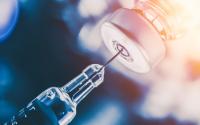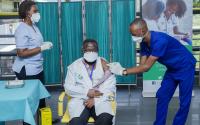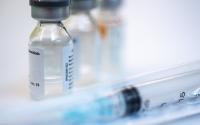[ad_1]
An interim analysis of data from a phase 3 clinical trial of Russia’s two-dose Gam-COVID-Vac (Sputnik V) coronavirus vaccine involving nearly 20,000 adult volunteers suggests an efficacy of 91.6% against symptomatic infection.
In the randomized, controlled, double-blind study, published today in The Lancet, researchers from the Ministry of Health of the Russian Federation in Moscow randomly assigned 19,866 participants at 25 hospitals and clinics in a 3:1 ratio to receive either the adenovirus-based vaccine or a placebo from Sep 7 to Nov 24, 2020. A 0.5-milliliter (mL) dose was given, followed by a second dose 21 days later.
Table of Contents
High efficacy in older recipients
After the second dose, 16 of 14,964 (0.1%) of vaccine group participants tested positive for COVID-19, versus 62 of 4,902 (1.3%) in the placebo group. The observed vaccine effectiveness was higher than 87% in all age and sex subgroups, including a 91.8% efficacy in volunteers older than 60 years.
Fifteen to 21 days after the first vaccine dose, efficacy was 73.6%, climbing to 100% after the second dose. No cases of moderate or serious COVID-19 were reported in the vaccine group, compared with 20 cases in the placebo group, for a vaccine efficacy of 100% against these disease severities.
Forty-two days after the first dose, 98% of vaccine group participants had detectable levels of SARS-CoV-2 antibodies, compared with 15% in the placebo group. Volunteers aged 18 to 30 years had significantly higher levels of antibodies than other age-groups.
Most adverse events (94%) were considered mild, while 0.3% of the vaccine group and 0.4% of the placebo group experienced severe adverse events, none of them considered vaccine-related. Four participants died during the study, three in the vaccine group and one in the placebo group (<0.1% of each group); none were linked to the vaccine.
Study on single-dose option under way
The Sputnik V vaccine is already being used in Russia, with more than 2 million doses administered to the public as of Jan 23, the authors noted. They added that the findings suggest that the vaccine, which consists of two adenovirus vectors that express the coronavirus’ spike protein, is highly effective, mounts a robust antibody and T-cell response, and has a good safety profile in adults.
“Stopping the COVID-19 pandemic requires the introduction of different vaccines based on different mechanisms of action to cover diverse global health demands,” lead author Denis Logunov, PhD, said in a Lancet news release. “Our vaccine, along with other SARS-CoV-2 vaccines, helps to diversify the world SARS-CoV-2 vaccine pipeline.”
The trial is ongoing, with the goal of recruiting 40,000 volunteers. Because the study could detect COVID-19 infections only when volunteers reported symptoms and were tested, the researchers said they could not determine its efficacy in preventing asymptomatic infection and transmission.
The authors, who called for further research into the duration of vaccine protection and its use in children, teens, pregnant and lactating women, and nonwhite participants, said they are also investigating a single-dose vaccine regimen.
Another weapon in vaccine arsenal
In a commentary in the same journal, Ian Jones, PhD, of the University of Reading in the United Kingdom, and Polly Roy, PhD, of the London School of Hygiene & Tropical Medicine, said that adenovirus-based vaccines, like Sputnik V and the one produced by AstraZeneca/University of Oxford, generate a robust response after the first dose and don’t require ultra-cold storage.
“The downside of recombinant adenovirus-based vaccines is that large doses are required, typically 1010 or 1011 particles, which makes large demands on the manufacturing and quantitation required for rollout on a global scale,” they wrote.
But despite the need for large doses and some experts’ criticisms of the seeming haste and lack of transparency in the development of Sputnik V, Jones and Roy said “The outcome reported here is clear and the scientific principle of vaccination is demonstrated, which means another vaccine can now join the fight to reduce the incidence of COVID-19.”
[ad_2]
Source link












